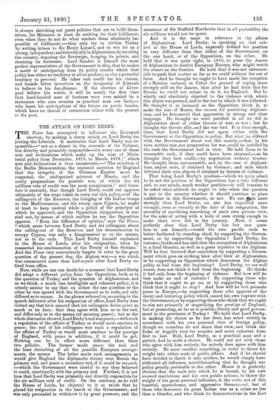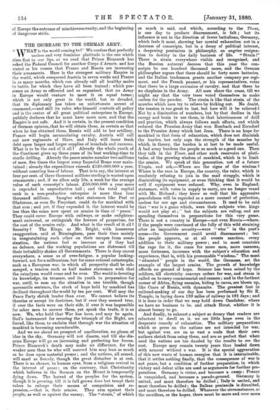THE ATTACK ON LORD DERBY.
THE Times has attempted to influence the Liverpool election, by making a sharp attack on Lord Derby for joining the Liberals. It maintains that Lord Derby was re- sponsible—" not as a sharer in the counsels of the Cabinet, but directly and primarily responsible—for every one of those acts and declarations which make up the sum of Minis- terial policy from December, 1875, to March, 1878 ;" which acts and declarations it thus enumerates,—" The rejection of the Berlin Memorandum, the repeated assertion by England that the integrity of the Ottoman Empire must be respected, the undisguised mistrust of Russia, and the costly preparations for possible war, of which the six millions vote of credit was the most conspicuous ;" and there- fore it contends, that though Lord Derby could not approve ultimately of the steps taken to carry out this policy,—of the calling-out of the Reserves, the bringing of the Indian troops to the Mediterranean, and the swoop upon Cyprus, he ought at least to keep neutral while a policy of the principle of which he approved, and the Opposition disapproved, is car- ried out, by means of which neither he nor the Opposition approve. "Even the difference of opinion," says the Times, "which arose between Lord Derby and his colleagues about the calling-out of the Reserves and the determination to occupy Cyprus, was only a disagreement as to the means, not as to the ends. This Lord Derby himself explained in the House of Lords, after his resignation, when he reasserted his condemnation of the Treaty of San Stefano." And the Times very conveniently forgets to refer to the great question of the present day, the Afghan war,—a war which was commenced more than half-a-year after Lord Derby re- tired from office.
Now, while no one can doubt for a moment that Lord Derby did adopt a different policy from the Opposition, both as to the question of Turkey and the question of Afghanistan, and as we think, a much less intelligible and coherent policy, it is utterly untrue to say that on either the one question or the other he was agreed with the Government as to ends, and only differed as to means. In the phrase referred to, occurring in the speech delivered after his resignation of office, Lord Derby does indeed say that he is assured that his colleagues desire peace as much as he does ; that they agree with him as to the end, and differ only as to the means (of securing peace); but as the whole discussion showed,Lord Derby's end was peace,—with such a regulation of the affairs of Turkey as would most conduce to peace ; the end of his colleagues was such a regulation of the affairs of Turkey as would most conduce to the prestige of England, with peace in addition, if it could be got. Nothing can be in effect more different than these two policies. The former made peace the end, and the least disturbing of all the possible European arrange- ments, the means. The latter made such arrangements as would give England the diplomatic victory over Russia the primary end, and peace a secondary end, if it could be secured, —which the Government were careful to say they believed it could, consistently with the primary end. Further, it is not true that Lord Derby was primarily and directly responsible for the six millions vote of credit. On the contrary, as he told the House of Lords, he objected to it so much that he placed his resignation in the hands of the Government, and was only persuaded to withdravi it by great pressure, and the assurance of Sir Stafford Northcote that in all probability the six millions would not be spent.
And it is the same in reference to the affairs of Afghanistan. Lord Derby, in speaking on that sub- ject in the House of Lords, expressly defined his position as very different from that either of the Government, on the one hand, or of the Opposition, on the other. He held that it was quite right, in 1876, to press the Ameer of Afghanistan to receive European Envoys, who might watch the events on the frontier. He held that it was not unreason- able to push that matter as far as we could without the use of force. And he thought we ought to have made the reception of a Russian embassy at Cabul the ground of urging more strongly still on the Ameer, that after he had done this for Russia, he could not refuse to do it for England. But he wholly and absolutely objected to the violence with which this object was pressed, and to the war by which it was followed. He thought it as immoral as the Opposition think it, to make the sins of Russia the excuse for punishing Afghani- stan, and he denounced that aggression in strong and clear language. He thought we were justified in all we did in Afghanistan short of either threats of war, or war ; but he thought the threats silly, and the war bad. It is clear enough, then, that Lord Derby did not agree either with the Government or the Opposition in policy. But what he differed with the Government about was this mainly,—that, in his view, neither war, nor preparation for war, could be justified by the ends the Government had in view. He held them to be reasonable ends, if they could have been obtained,—as he thought they best could,—by negotiation without bluster. He thought them unreasonable, and, in the case of Afghani- stan, unjust ends, if obtained by violence ; and ends which defeated their own objects if obtained by threats of violence.
That being Lord Derby's position—which we quite admit to be not the position of the Opposition, but a very different and, to our minds, much weaker position—it still remains to be asked what attitude he ought to take when the question is put to the country whether it should continue to place confidence in this Government, or not. No one aols more strongly than Lord Derby, no one has expressed more strongly, even as recently as the date of his resignation, the necessity of sacrificing something of one's own private view, for the sake of acting with a body of men strong enough to make their view felt in the country. Now, it seems perfectly clear that Lord Derby has but one ques- tion to ask himself,—would his own pacific ends be better furthered by standing aloof, by supporting the Govern- ment, or by supporting the Opposition ? Lord Derby, for instance, thinks and has said, that the occupation of Afghanistan is a fatal blunder, as well as a gross injustice to the Afghans. Will he best forward that conviction by supporting a Govern- ment which goes on striking blow after blow at Afghanistan, or by supporting an Opposition which denounces the Afghan policy as bad from the beginning ? Lord Derby, we are well aware, does not think it bad from the beginning. He thinks it bad only from the beginning of violence. But how will he best make an end of violence? By supporting those who think that it ought to go on, or by supporting those who think that it ought to stop ? And how will he best promote peace in Europe,—by supporting those who approve of the showy and irritating policy which caused his own rupture with the Government, or by supporting those who think that we ought to aim not primarily at magnifying the prestige of England, but at promoting, so far as is possible, liberty and good govern- ment in the provinces of Turkey ? We hold that Lord Derby, in making his choice as he has done, has acted strictly in accordance with his own personal view of foreign policy, though we ourselves do not share that view, and think the Duke of Argyll's view far sounder and more coherent from first to last. Still, Lord Derby, as a practical man and a patriot, had to make a choice. He could not act with those who agree with him entirely, for nobody does agree with him entirely. He must sacrifice something, in order to throw his weight into either scale of public affairs. And if he should have decided to throw it into neither, he would simply have abdicated all influence, notwithstanding that he thought one policy greatly preferable to the other. Hence it is perfectly obvious that the scale into which he is bound, by his own avowed convictions and his own public actions, to throw the weight of his great personal influence, is the scale, not of this boastful, quarrelsome, and aggressive Government, but of those who denounce its great Indian war as a crime no less than a blunder, and who think its demonstrations in the East of Europe the outcome of mischievous vanity, and the beginning of dangerous strife.



































 Previous page
Previous page